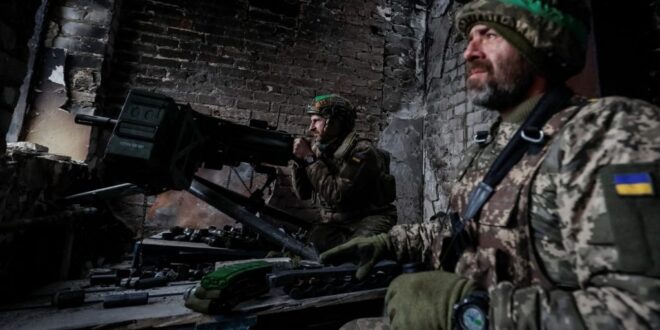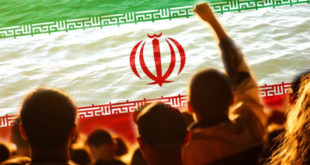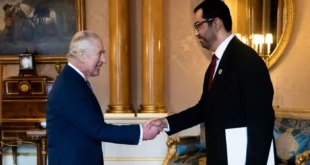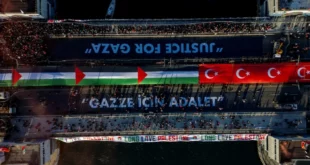No Ukrainian will ever forget the morning of February 24, 2022, when life as we knew it was shattered by the enormity of Russia’s full-scale invasion. I was awoken in Lviv that morning by a constant stream of phone calls from people asking for help. This was nothing new, as I had been supporting the Ukrainian military since the onset of Russia’s attack on Ukraine in 2014. However, it was immediately apparent that we were facing something on a different scale entirely; the largest European war since the days of Hitler and Stalin was underway in my homeland.
Despite the horror of the situation, Ukrainians did not panic. Many made their way to join the military or signed up for local territorial defense units. Others brought vital supplies including everything from food and medicines to bullets and bulletproof vests. People across the country begun fundraising via social media and other online platforms. Civil society support networks developed through Ukraine’s two people power revolutions and the past eight years of resistance to Russian aggression in Crimea and eastern Ukraine grew larger and stronger. Just hours after news of the Russian invasion had stunned the watching world, Ukrainians were already establishing logistical channels that would allow civilian volunteers to support the fightback.
I rushed to Kyiv while issuing a social media appeal for people to come and collect what supplies we had from our office, which had already been transformed into a volunteer hub. Within a couple of days, we had assembled an entire team to work on meeting the needs of Ukraine’s defenders. It soon became clear that nothing is impossible for Ukrainians. The entire nation united in defiance of Russia’s invasion. On the battlefield, Ukrainian troops out-thought and outfought the Russian invaders with a combination of innovative tactics and raw courage. Using a range of newly acquired Western arms along with older weapons largely inherited from the Soviet era, they were able to destroy entire columns of Russian tanks and inflict devastating casualties on Putin’s army.
Ukraine’s remarkable resilience would have a profound impact on global opinion and would go on to shape the international response to the Russian invasion. On the eve of Russia’s attack, many Western leaders believed Ukraine would fall within a matter of days and were deeply reluctant to provide weapons, partly as they feared their technology would soon be captured by the advancing Russians. However, when it became apparent that Ukrainians were both willing and able to resist the invasion, the democratic world soon warmed to the idea of supporting Ukraine in its fight for survival. A dramatic shift began to take place with more and more countries lining up to stand with Ukraine. Looking back, it is now clear that the strength of the Ukrainian nation in those momentous first days of war changed the course of world history.
As the war unfolded during the spring months, so too did Ukraine’s volunteer efforts. Improvised initiatives to source supplies for volunteer fighters rapidly evolved into nationwide projects with the support of millions of private and corporate donors both in Ukraine and across Europe, North America, and beyond. By summer 2022, Ukrainians were crowdfunding sophisticated combat drones, armored vehicles, and a satellite. Since the first days of the invasion, Ukrainian social media has been full of posts showing the latest deliveries of drones, jeeps, radio equipment, and night vision goggles for the troops on the front lines. These efforts have made it easier for the government to concentrate its limited resources on acquiring big ticket items such as artillery, air defense, and missile systems.
Ukraine’s popular resistance has undoubtedly impressed the world. This is evident in the reactions I encounter while traveling to Western capitals. I sense a sincere respect for the Ukrainian people when speaking with government officials and members of the public alike; I can also see this respect in the countless Ukrainian flags on display throughout the Western world that serve as universal symbols of freedom and bravery. Most of all, the West has shown its support by providing Ukraine with billions of dollars in military aid. These Western weapons have had a major impact on the course of the war, enabling Ukraine to destroy advancing Russian forces, strike ammunition bases far behind the front lines, and protect Ukraine’s cities from Russian airstrikes.
While international support for Ukraine has been hugely effective, major challenges lie ahead. Following initial setbacks, Russia is now preparing for a long war. Putin has launched the country’s first mobilization since World War II and is attempting to place the Russian economy on a war footing. Meanwhile, Kremlin propaganda is warning the Russian public that they are locked in a fight for survival. Despite suffering catastrophic losses in both men and machines, the Russian dictator remains determined to pursue his goal of destroying the Ukrainian state and extinguishing Ukrainian identity. With no sign of any serious domestic opposition to the war inside Russia, he appears in a position to continue the current invasion indefinitely.
Is the West really prepared for the kind of long war that Putin clearly has in mind? Recent indications such as US President Joe Biden’s visit to Kyiv and the move to provide Ukraine with modern battle tanks indicate that the democratic world will not waver in its support for Ukraine. Indeed, this was the key message during Biden’s surprise trip to the Ukrainian capital. At the same time, the delays that preceded the recent decision to deliver Leopard 2 tanks sent an ominous signal to a country fighting for its life. Every lost day means hundreds of Ukrainian lives. As the death toll rises, so does frustration over the apparent lack of urgency among many of Ukraine’s partners.
 Eurasia Press & News
Eurasia Press & News



